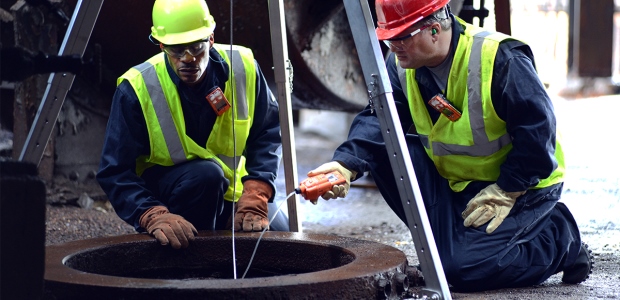
Is 'Big Brother' Watching Me or My Back?
If your best friend, whom you’ve known for years, suddenly fell over in a confined space, how would you respond? Would you rush in to save him or her?
With the technology available today, you've probably thought a time or two, "Who is watching me?" Let's get real for a moment. Someone is monitoring some aspect of someone's life, somewhere. The question is, for what purpose? Well, now that I've got your conspiracy theory gears going, let's shift those gears and talk about the positive use for this technology: preserving life.
A gas monitor that can alert you of hazardous conditions, record user and site data, communicate with nearby devices, and signal for help is not a bad thing! In fact, it's quite the opposite. The untrusting sort may believe this data is being collected for future use against them—to track their whereabouts and determine whether or not they are working, whether or not the gas detector is turned on, so on and so forth. Well, if we're talking about confined space entry or continuous monitoring, the gas detector gad better be turned on! What you may or may not be doing while you're on the clock is irrelevant in this article. I want to focus on one very specific point: Someone should have your back. In the military, we have the buddy system. I've heard the term "Brother's Keeper" in some industries and in others, it's the two-man rule. No matter where you go, if the situation is dangerous, you shouldn't be alone. So whom can you count on in an emergency?
Many strong relationships are formed in the workplace, and people spend many years growing older working side by side—spending time with each other’s families at parties, picnics, holidays, school events, etc. We become close, like family, and far too often, a single fatality on the job becomes a tragedy with multiple casualties because of improper emergency response due to those relationships. If your best friend, whom you’ve known for years, suddenly fell over in a confined space, how would you respond? Would you rush in to save him or her? Our gut reaction is to save those we care for; it's our nature.
What if you had the ability to call for help and, because of the gas detection device, you could give first responders an early indication of the danger that awaits them? A device that not only sends gas alarm data, but also includes helpful information such as who was in trouble and their location, leads to a faster, more intelligent plan of response. With peer-to-peer wireless and Bluetooth beacons combined with the latest wireless personal and area gas monitors that communicate with one another, your chance of survival drastically improves.
The Value of Early Warnings
Your team members in a peer-to-peer wireless group can be immediately aware of the gas alarms or non-gas hazards detected by your personal instrument or the group can be notified of a possible gas leak from the fence line you established with the wireless area monitor you placed before the work commenced that day.
The data collected by the gas detector is intended to identify hazards that are dangerous to your health and potentially life threatening. If your safety manager is able to identify and correct a faulty process because of an instrument you were wearing and it made your workplace safer for everyone, what possible argument do you have against that? If you are in trouble and press the Panic Button or the Man-down Alarm is activated on your instrument after you fall and are knocked unconscious, why wouldn’t you want someone to respond as fast as possible?
If the co-worker who happens to be your brother, the best man at your wedding, and the godfather to your children suddenly falls due to a gas exposure, wouldn't you want responders to know as much as possible so they know how to safely rescue him?
Placing the shoe on the other foot, so to speak, let's talk about management's role. It is the responsibility of team leaders to ensure that safety professionals have the tools necessary to protect themselves while also following proper policies and procedures. Workers need to trust and believe that leaders are looking out for their safety. Taking action on the hazards found is a quick way to earn that trust. Use the data that the gas detector is collecting and have conversations with those using the detectors. Teach them. Encourage them. Help them understand.
Everyone has someone counting on him or her to make it home at the end of the day. Maybe it's a spouse or parent, or maybe your children. If data collected by gas detectors can help make the workplace safer so all employees make it home to their families, someone needs to be watching your back—and you should feel better knowing they are.
This article originally appeared in the August 2017 issue of Occupational Health & Safety.